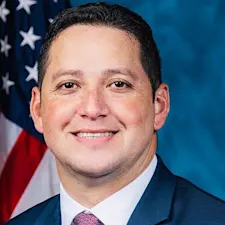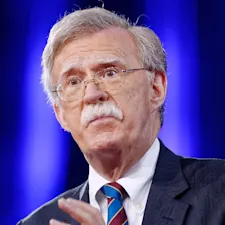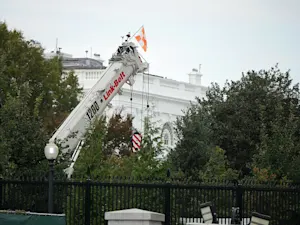
Trump Ends Trade Talks Over Controversial Reagan Ad
Official portrait photograph of Ronald Reagan, 1981. Photo courtesy of Michael Evans. Public domain.
President Donald Trump has abruptly ended trade negotiations with Canada after a television ad from Ontario sparked a diplomatic firestorm. The ad, which reportedly used archival audio of former President Ronald Reagan warning against tariffs, drew Trump's ire, who called it "fake" and accused Canada of trying to influence a pending US Supreme Court case on tariffs.
A Tariff Dispute Ignited by Reagan's Voice
The controversy began when Ontario launched a US advertising campaign featuring excerpts from Reagan's 1987 radio address. In the ad, Reagan cautioned that tariffs "hurt every American worker and consumer" and warned of retaliation and trade wars, as reported by the Associated Press. The commercial aired during the first two games of the World Series, a high-profile platform that amplified its impact.
Doug Ford, Ontario premier, announced the campaign on Twitter, saying the province would "never stop making the case against American tariffs on Canada" and called for cooperation to "build Fortress Am-Can," as reported by Business Insider.
Trump furiously accused Canada of fraudulently using Reagan's words. He posted on Truth Social that the ad was "FAKE," as reported by the Associate Press, and declared all trade negotiations with Canada terminated. Trump claimed the ad was Canada's "hope that the United States Supreme Court will come to their 'rescue' on Tariffs," as reported by ABC News.
The Reagan Foundation Weighs In
The Ronald Reagan Presidential Foundation and Institute criticized the ad, stating it "misrepresents" Reagan's 1987 address and that Ontario did not seek permission to use or edit the remarks, as reported by ABC News. The foundation said it was exploring legal options.
Reagan's 1987 speech was made during a period when he had imposed tariffs on Japanese semiconductors, a move that seemed at odds with his free-trade reputation. The speech warned that tariffs lead to retaliation, higher trade barriers, and shrinking markets. Reagan himself described tariffs as "steps that I am loath to take," but felt compelled due to trade violations, as reported by the Associated Press.
Trump's Tariff Strategy and the Supreme Court Case
Trump, who has embraced tariffs as a key economic tool, has imposed double-digit tariffs on many countries since returning to the White House. According to Yale's Budget Lab, the average effective U.S. tariff rate rose from about 2.5% to 18%, the highest since 1934, as reported by the Associated Press.
The US Supreme Court is reportedly set to hear a case challenging Trump's sweeping tariff policies, adding urgency to the dispute. Trump accused the Canadian ad of attempting to interfere with the court's decision and other judicial matters.
Ontario's Response and Trade Talks on Ice
Doug Ford moved to de-escalate tensions by announcing the ad would be pulled from US airwaves to allow trade talks to resume. Ford emphasized the close relationship between Canada and the US, calling them "neighbors, friends and allies" and urging cooperation, as reported by Business Insider.
Despite Ford's efforts, Trump doubled down, announcing an additional 10% tariff on Canadian imports, citing the ad's airing during the World Series as a "hostile act," as reported by ABC News.
US Officials Sound Off
US Treasury Secretary Scott Bessent called Ontario's ad "propaganda" and "psy-ops" during an appearance on NBC's "Meet the Press," as reported by Business Insider. In a separate "Face the Nation" interview, Bessent went on to say the ad had "clearly damaged" relations with Canada's most populous province and described it as "interference in US sovereign matters."
The Stakes of a Trade War Between Allies
The dispute highlights how media campaigns have become a battleground in global trade policy. What started as a tariff disagreement has morphed into a clash over historical legacy and messaging, with Ontario leveraging Reagan's iconic voice against Trump's aggressive tariff agenda.
Trump's reaction frames the ad as a threat to US sovereignty, while Canada's use of Reagan's words underscores the political theater surrounding trade disputes. The escalating tariffs risk further straining relations between two longtime allies and trading partners.
What's Next?
With trade talks frozen and tariffs rising, the path forward remains uncertain. The Supreme Court's upcoming decision on Trump's tariff authority could reshape US trade policy. Meanwhile, the diplomatic fallout from this ad-driven feud serves as a reminder that in today's media landscape, even historical speeches can ignite modern conflicts.
You can expect the drama to continue playing out on social media, television, and courtrooms as both sides navigate this high-stakes dispute.
References: Trump raises tariffs on Canada 10% after Reagan ad airs during World Series | Trump's Feud With Canada: How a Ronald Reagan Ad Sparked New Tariffs | Trump says a Canadian ad misstated Ronald Reagan's views on tariffs. Here are the facts and context
























